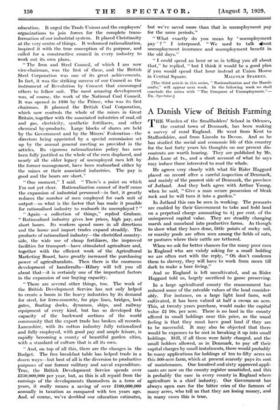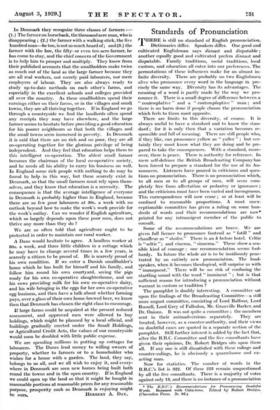A Danish View of British Farming
THE Warden of the Smallholders' School in Odensee, the central town of Denmark, has been making a survey of rural England. He went from Kent to Staffordshire, and from Lincoln to Devon. And as he has studied the social and economic life of this country for the last forty years his thoughts on our present dis- contents are worth hearing. They are published by Mr. John Lane at ls., and a short account of what he says may induce those interested to read the whole.
He agrees very closely with what Sir Rider Haggard placed on record after a careful inspection of Denmark, and mainly of the poorest side of Denmark, the province of Jutland. And they both agree with Arthur Young, when he said, " Give a man secure possession of bleak rock and he will turn it into a garden."
In Jutland this can be seen in working. The peasants are enabled by their Government to take and hold land on a perpetual charge amounting to 4i per cent. of the unimproved capital value. They are steadily changing marsh and moorland into productive farms. As though to show what they have done, little points of rocky soil, or marshy pools are often seen among the fields of oats, or pastures where their cattle are tethered.
When we ask for better chances for the many poor men in England who are vainly asking for a small holding we are often met with the reply, " Oh don't condemn them to slavery, they will have to work from morn till dark to make a bare living."
And so England is left uncultivated, and as Rider Haggard told us, largely sacrificed to game preserving.
In a large agricultural county the reassessment has reduced some of the rateable values of the land consider- ably. For instance, on a large light land farm, well cultivated, it has been valued at half a crown an acre. This, at twenty years purchase, would make the capital value £2 10s. per acre. There is no land in the county offered in small holdings near this price, as the usual feeling is that they must have good land if they are to be successful. It may also be objected that there would be expenses to be met in breaking it up into small holdings. Still, if all these were fairly charged, and the small holders allowed, as in Denmark, to pay off their capital charges by small instalments, there would probably be many applications for holdings of ten to fifty acres on this 500-acre farm, which at present scarcely pays its cost of maintenance. One hundred and sixty approved appli- cants are now on the county register unsatisfied, and this is probably the case in every county in England where agriculture is a chief industry. Our Government has always open ears for the bitter cries of the farmers of many acres, who tell us that they are losing money, and in many eases this is true. Li Denmark they recognize three classes of farmers (1.) The farmer on horseback, the thousand acre man, who is disappearing ; (2.) the farmer with a walking stick, the five hundred man—he too, is not so much heard of; and (8.) the farmer with the hoe, the fifty- or even ten-acre farmer, he has come to stay, and the chief concern of the Government is to help him to prosper and multiply. They know from their published accounts that the smallholders make twice as much out of the land as the large farmer because they are all real workers, not merely paid labourers, nor mere employers of labour. They are also always ready to study up-to-date methods on each other's farms, and especially in the excellent schools and colleges provided all over the country. As these smallholders spend their earnings either on their farms, or in the villages and small towns, they are all thriving together. If in England we go through a countryside we find the landlords often spend any receipts they may have elsewhere, and the large farmer seems to hesitate before providing a good education for his poorer neighbours so that both the villages and the small towns seem immersed in poverty. In Denmark it is said that there are no rich and no poor, they are all co-operating together for the glorious privilege of being independent. And they feel that education helps them to this intelligent co-operation. The ablest small farmer becomes the chairman of the local co-operative society, and he needs all his ability to carry his business on well. In England some rich people with nothing to do may be found to help in this way, but these scarcely exist in Denmark, so that the small farmers must rely upon them- selves, and they know that education is a necessity. The consequence is that the average intelligence of everyone in Denmark is probably higher than in England, because there are so few poor labourers at 30s. a week with no outlook beyond how to make the week's work provide for the week's outlay. Can we wonder if English agriculture, which so largely depends upon these poor men, does not thrive any more than they do ?
We are so often told that agriculture ought to be protected in order to maintain our rural worker.
A Dane would hesitate to agree. A landless worker at 30s. a week, and three little children in a cottage which he may have to change several times in a few years, is scarcely a citizen to be proud of. He is scarcely proud of his own condition. If we enter a Danish smallholder's home which he has built for himself and his family, and follow him round his own courtyard, seeing the pigs ready for his own co-operative slaughterhouse, and see his cows providing milk for his own co-operative dairy, and his wife bringing in the eggs for her own co-operative egg business, and then have a talk about whether farming pays, over a glass of their own home-brewed beer, we know then that Denmark has chosen the right class to encourage.
If large farms could be acquired at the present reduced assessment, and approved men were allowed to buy holdings, which might be planned by a local official, and buildings gradually erected under the Small Holdings, or Agricultural Credit Acts, the values of our countryside would soon be doubled with little public expense.
We are spending millions in putting up cottages for labourers. The Danes lend money to willing owners of property, whether to farmers or to a householder who wishes for a house with a garden. The land, they say, belongs to us all, and we all wish to enjoy it, and every- where in Denmark are seen new homes being built both round the towns and in the open country. If in England we could open up the land so that it might be bought in reasonable portions at reasonable prices for any reasonable purpose, prosperity such as Denmark is enjoying might



































 Previous page
Previous page